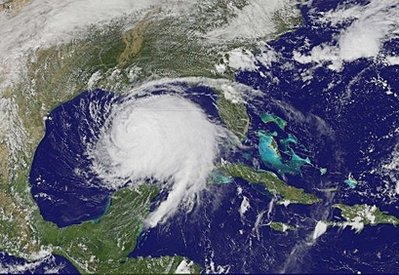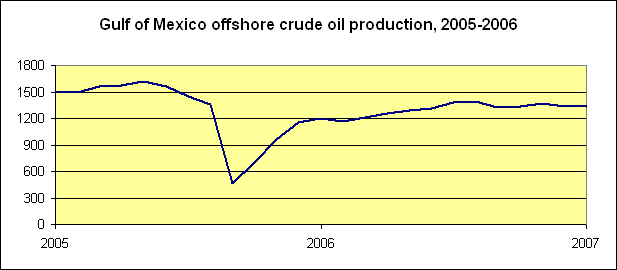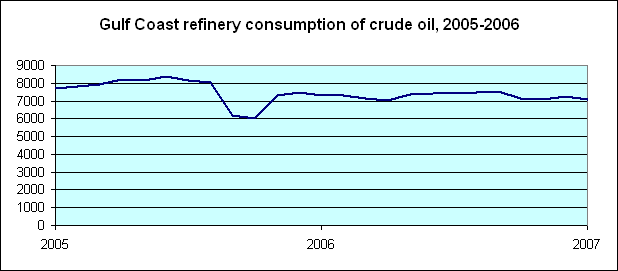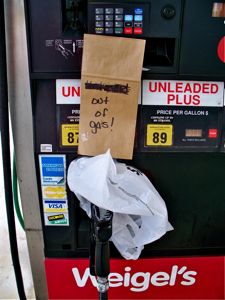As Hurricane Ike took over the Gulf of Mexico, I watched with unusual interest, since I had been scheduled to fly through Houston to give a lecture in Baton Rouge on Friday. We had to cancel that visit to LSU, which left me to contemplate the consequences of Hurricane Ike for oil and gas markets from the comfort of my warm, snug home in San Diego.
 |
Essentially all of the 1.3 million barrels per day of U.S. crude oil production from the Gulf of Mexico (which accounts for about a quarter of total U.S. production) has been shut in as a result of the storm. When the same thing happened 3 years ago with Hurricane Katrina, the effects turned out to be surprisingly long-lived. Damage to offshore rigs proved costly to repair, and in some cases due to field depletion the platforms were abandoned rather than repaired. We will have to wait for an assessment of how extensive the damage will be this time around. The absence of a significant spike up in oil prices at the end of last week suggests that many market participants were not so worried this time.
 |
The other concern is refining capacity. Texas and Louisiana do about half of the nation’s refining, and Bloomberg reports that 20% of the nation’s refining capacity was shut down by the storm. That again is comparable to what we saw 3 years ago with Katrina, in which again several of the damaged refineries took some time to repair. Damage to refineries this time may be less serious than originally feared. But even if there is no damage, it could still take a week or two to restart the refineries, and before Ike gasoline inventories were quite low.
 |
But there’s another factor in the mix this time as well. Governors and attorneys general in Tennessee,
Florida, Missouri, North Carolina and doubtless many other states announced plans to crack down on “price gouging.” In the current political and legal environment, fears of prosecution for this “crime” will surely prevent the price from rising to the point at which supply equals demand. That means we should expect to see shortages.
 |
But shortages and fears of a return to higher prices are additional motivations for people to buy gas when and where they can. If the governor orders prices to stay put, that provides a powerful reason for everyone to fill up their tanks now. And the surge in demand from that source can be an even bigger shock to the system than the supply outages themselves. Via Instapundit, Knoxnews.com reports:
As for fuel availability, Pilot hasn’t run out at any of its stores, but is struggling to make sure supplies remain constant. A fuel shipment from Colonial Pipeline’s main trunk into Knoxville that was originally slated to arrive Saturday, then was postponed until Tuesday, has now been pushed back to Thursday, [Pilot’s vice president for supply and distribution Alan] Wright said.
The problem now is not just less fuel coming from the refineries, but a run on the pumps by drivers, he said.
“The fuel situation for Pilot really hasn’t changed a whole lot since yesterday. We have fuel right now and we continue to deliver fuel to our stores; the problem we have is we are selling about twice as much fuel as we normally would,” he said.
Wright said he anticipated there will be more spikes in fuel prices and short supplies over the next two to three weeks after Ike hits.
Pilot isn’t the only local gasoline retailer watching the fuel situation deteriorate.
“I’ve been in this business 50 years and this has never happened before,” said Bill Weigel, head of the Weigel’s chain of convenience stores in Knox, Blount, Sevier, Loudon, Anderson and Monroe counties.
Weigel, who said Thursday that about a half-dozen Weigel’s stores had run out of gas, declined to say how many more stores had run dry Friday.
Gee, and I had been all ready to share the good news that the drop in gasoline prices prior to Ike seemed to produce a remarkable bump back up in consumer sentiment.
 |
Technorati Tags: oil,
oil prices,
gas prices
Hurricane Ike,
Ike,
gasoline,
economics,
macroeconomics
intapundit? what a shill of a site
lets go back to school shall we?
“In such a nation [as ours], there is one and one only resource for loans, sufficient to carry them through the expense of a war; and that will always be sufficient, and in the power of an honest government, punctual in the preservation of its faith. The fund I mean, is the mass of circulating coin. Everyone knows, that although not literally, it is nearly true, that every paper dollar emitted banishes a silver one from the circulation. A nation, therefore, making its purchases and payments with bills fitted for circulation, thrusts an equal sum of coin out of circulation. This is equivalent to borrowing that sum, and yet the vendor receiving payment in a medium as effectual as coin for his purchases or payments, has no claim to interest. And so the nation may continue to issue its bills as far as its wants require, and the limits of the circulation will admit… But this, the only resource which the government could command with certainty, the States have unfortunately fooled away, nay corruptly alienated to swindlers and shavers, under the cover of private banks.” –Thomas Jefferson to John W. Eppes, 1813. ME 13:274
Are prices rising enough so that gas stations do not run out of gas the most desirable solution.
In a time of gasoline shortage why is having gasoline left unused in underground storage at a gas station the optimal use of that gasoline?
—
I wonder if some retail automobile fuel outlets have deliberately kept prices relatively low and have thus run the risk of supply depletion because they fear vandalism or political retribution.
It is interesting to observe how in a temporary crisis like this, most folks appear to prefer first-come, first-serve rules than higher prices to resolve scarcity.
I fully expect retail prices to be much, much lower in the near future–a matter of 2 to 4 weeks. The Lehman Brothers implosion should help. The question, however, is will American consumer confidence recover as quickly? My caribou shoulder blades suggest that consumer confidence will take much longer to fully recover.
The gulf coast refineries were NOT the only ones hit. Chicago, Detroit, and much of the midwest were hit by the hurricane and a big storm right before. We got 10 inches of rain in the last 3 days. Flooding is widespread throughout Chicago.
Add to this that now is the time that refineries do their fall turnarounds… and you have a gasoline shortage. For example, Exxon-Mobile Joliet has their cat cracker down now. Wholesale prices in the Chicago area were high even before the storms.
I just paid $4.25 a gallon this morning. I saw prices at $3.79 last thursday. Should have filled up!
I did my part though. Because of the crazy price, I only bought 5 gallons. Here’s to hoping that the refineries come back soon!
This time I got to watch the gas shortages with my own eyes.
I’ve blogged and commented on this, and I’ve come down to a few quick conclusions:
1. My city has the same amount of gas as before, except now it’s spread over a million gas tanks instead of available for purchase.
2. Psychologically, people have reverted to USSR-style hoarding. “Buy now because you may not be able to buy later.”
I’m wondering how to address point 2. How would people react if the city[1] ran a $10-a-gallon “emergency gas station.” My hypothesis is that very few people would purchase it, but it would stop people from worrying that no gas would ever be available.
I’ve also proposed before that the city/county contract with individual gas stations to ensure that they keep a certain amount of supply on hand. That seems an economically wiser way of dealing with shortages during emergencies.
[1] It doesn’t need to the city, but that would hopefully help people from stopping to scream “gouging.”
Professor,
Thank you for a reasonable analysis of “price gouging.” When the government prevents “price gouging” it always leads to shortages.
I recall a story about hurricane Hugo in South Carolina. A couple of enterprising college students bought a truck load of ice. After the hurricane they drove the truck into the devastated area and began to sell the ice at twice the normal price. They had a line blocks long. Then came the “price police” and the students were arrested and their ice confiscated. But the amazing thing is that those in line who were still had no ice applauded as the students were taken away. It was illogical to me. People were willing to pay for the ice at twice the price but were willing to do without ice if the providers were locked up. I am still trying to figure that one out.
Not only that DickF, but these people were willing to expend valuable resources by queuing for the ice. Sunk-cost resentment at work?
I should add to my original comment on firms seeking to avoid vandalism or political retribution that Thaler, Kahneman and Knetsch (1986) in the AER argued that firms will avoid elevating prices to market-clearing levels in order to assure consumer loyalty.
The NYT has an article on this subject here:
Lessons From a Hurricane: It Pays Not to Gouge, By STEVE LOHR, September 22, 1992
I think the usual gang of blog prowlers is too busy fighting the political fight elsewhere. I still like basic economic posts like the one here.
I could understand prices going up some because of natural events like Ike, however in my area and several others the prices were going up before Ike actually hit. They went up from $3.56/gal to $4.29/gal in the period of a day here, that’s a big raise for gas they already had in the pumps to begin with. I think business’s now days are only thinking about more ways they can profit, including price gouging whenever possible.
I posted about this as well, if your interested you can read my post here.
Granted, I get the oil and gas industry is taking a hit as a result of Ike. However, which industries might take the lead in giving our anemic economy some iron? What about the construction industry and material suppliers? Looks like to me that there will be a lot of infrastructure (road, bridge) repair/construction needed to get the Gulf Coast region (primarily Texas) on its feet again. What about the materials needed for residential and commercial reconstruction?
Surely, there’s a silver lining here somewhere?!
Here is some basic economics: prices are determined by supply and demand.
If everyone is going out to “top off” in advance of the hurricane, prices are GOING to go up. The demand has increase, and in the short term, the supply is essentially fixed.
If I tell you that gas is going to be $4.20 tomorrow, what are you going to sell it to me for today?
(Assuming you have access to a big storage tank.)
As long as there is storage, there is an arbitrage opportunity if present prices diverge significantly from future prices.
Rincon: Anything that destroys productive capacity reduces wealth levels: war, extreme acts of nature, unanticipated and unscheduled depreciation. Per capita wealth is what should matter the most, much more so than aggregate GDP growth.
Hurricane destruction will stimulate reconstruction efforts in the short-run but to suggest that is a ‘good thing’ is to subscribe to the ‘broken window theory’ of economic policy.
Of course, a much worse outcome could occur under a political-economic system that impedes reconstruction. See Carlos Alberto Montaner’s article entitled
Socialism and “Acts of God” published 12 September 2008 on the Independent Institute’s web-site.
“Price gouging” is not price changes as a results of changes in supply and demand. Also, a quick look at at gas prices around parts of town with different income levels will show you that companies do engage in price discrimination, which can be viewed as a form of price gouging. So, gas companies are not above “price gouging”.
The gas market is not competitive. Furthermore, demand in very inelastic. Gas companies have some leeway in the pricing of gas. I think that gas companies are “price gouging” to the extent that they are pricing to making a profit off consumers from a natural disaster above and beyond what their “normal” profit margin should be or has been. Whatever normal means.
The only gas i can get in this area is 5.99 a gallon for 100 octane racing gas, which is to feed my yamaha r6 for 2.5 trips to work, we dont have gas. DALLAS,NC 28034
OUR NATION IS SUFFERING FROM MANY ACTS OF GOD AND WE NEED TO GO WITH GOD AGAIN LIKE WE USE TO BE.
GOD’S ACTS ARE INTENDED TO ENCOURAGE US TO DEDICATE OUR NATION, OUR INDIVIDUAL LIVES TO GOD.
AS A NATION WE HAVE GONE FARTHER AWAY FROM HIM. ORGANS LIKE ACLU, COLLEGES, OTHER SCHOOLS, COURTS,
AND POLITICIANS ARE RUINING OUR NATION….I PRAY FOR US EVERY DAY.